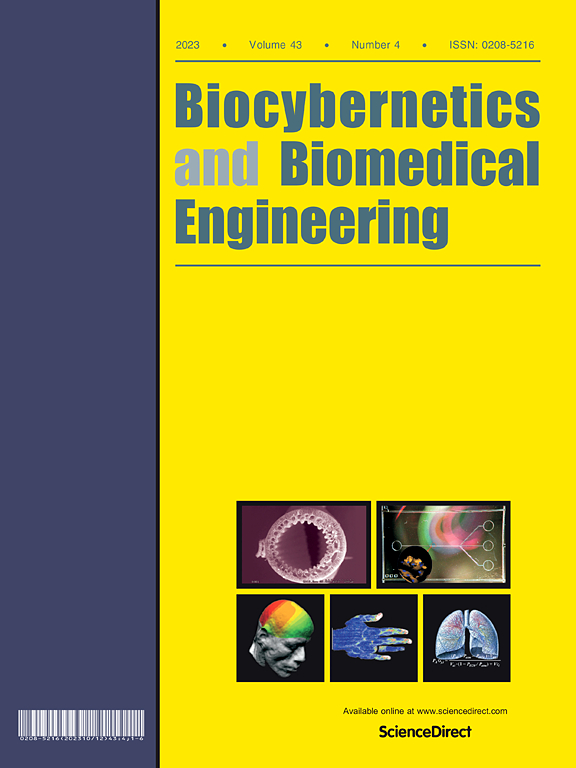MRS thermometry – Importance of scanner-specific calibrations for accurate brain temperature estimations
IF 6.6
2区 医学
Q1 ENGINEERING, BIOMEDICAL
引用次数: 0
Abstract
This study explores the importance of scanner-specific calibration measurements for Magnetic Resonance Spectroscopy Thermometry (MRST) in human brain temperature estimations. Data acquisition was conducted on a 3-T GE scanner. Calibration constants for the water-chemical shift were obtained using a temperature-controlled phantom containing an aqueous solution of N-acetyl aspartate (NAA), Creatine (Cr), and Choline (Cho), and data from three different research groups using the same metabolites. Temperatures were estimated utilizing correlation of water chemical shift with NAA, Cr and Cho. For data acquisition, commercially available single-voxel point-resolved spectroscopy (PRESS) sequences were used for calibrations and in vivo temperature estimations. Each sequence included spectras without (WU) and with (WS) water suppression. In vivo study consisted of two PRESS sequences, one before and one after extensive 30-minute fMRI task acquisition. Significant differences were found between absolute brain temperatures measured using scanner-specific calibrations and those from other researchers, varying from −0.68 °C to + 0.37 °C for NAA, −0.92 °C to 0.37 °C for Cr, and −0.78 °C to 0.7 °C for Cho. Each method reported a similar temperature decrease of −0.26 ∓ 0.03 °C between before and after fMRI measurements. These findings suggest that while absolute temperatures from non-scanner specific calibrations may be inaccurate, comparative estimates are valid.
磁共振测温。扫描仪特定校准对准确脑温度估计的重要性
本研究探讨了磁共振光谱测温(MRST)在人脑温度估计中扫描仪特定校准测量的重要性。数据采集采用3-T GE扫描仪。水化学位移的校准常数使用含有n -乙酰天冬氨酸(NAA)、肌酸(Cr)和胆碱(Cho)水溶液的温控模体获得,数据来自三个不同的研究小组,使用相同的代谢物。利用水化学位移与NAA、Cr和Cho的相关性估算温度。对于数据采集,使用市售的单体素点分辨光谱(PRESS)序列进行校准和体内温度估计。每个序列包括无(WU)和有(WS)水抑制的光谱。体内研究包括两个PRESS序列,一个在广泛的30分钟fMRI任务获取之前,一个在之后。使用扫描仪特定校准测量的绝对脑温度与其他研究人员测量的绝对脑温度之间存在显著差异,NAA为- 0.68°C至+ 0.37°C, Cr为- 0.92°C至0.37°C, Cho为- 0.78°C至0.7°C。每种方法在fMRI测量前后都报告了−0.26°C的相似温度下降。这些发现表明,虽然非扫描仪特定校准的绝对温度可能不准确,但比较估计是有效的。
本文章由计算机程序翻译,如有差异,请以英文原文为准。
求助全文
约1分钟内获得全文
求助全文
来源期刊

Biocybernetics and Biomedical Engineering
ENGINEERING, BIOMEDICAL-
CiteScore
16.50
自引率
6.20%
发文量
77
审稿时长
38 days
期刊介绍:
Biocybernetics and Biomedical Engineering is a quarterly journal, founded in 1981, devoted to publishing the results of original, innovative and creative research investigations in the field of Biocybernetics and biomedical engineering, which bridges mathematical, physical, chemical and engineering methods and technology to analyse physiological processes in living organisms as well as to develop methods, devices and systems used in biology and medicine, mainly in medical diagnosis, monitoring systems and therapy. The Journal''s mission is to advance scientific discovery into new or improved standards of care, and promotion a wide-ranging exchange between science and its application to humans.
 求助内容:
求助内容: 应助结果提醒方式:
应助结果提醒方式:


